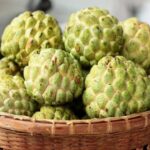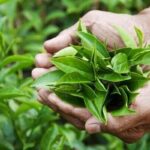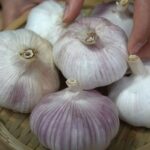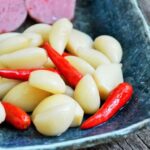According to BS.CKII Huynh Tan Vu, head of the Day Treatment Unit at Ho Chi Minh City University of Medicine and Pharmacy, dill is also known as thyme or fennel. Its leaves are a familiar spice that is indispensable in fish soup, eel soup, and snail dishes, enhancing the flavor and masking any unpleasant odors.
In Ho Chi Minh City’s markets, supermarkets, and convenience stores, dill is priced at around VND 80,000 to 90,000 per kilogram. However, this vegetable is rarely purchased by consumers. The owner of a vegetable shop in Thu Duc City shared that only those who are connoisseurs of dill would buy it to fry with eggs, cook with carp soup, or use it as an ingredient in various patties.
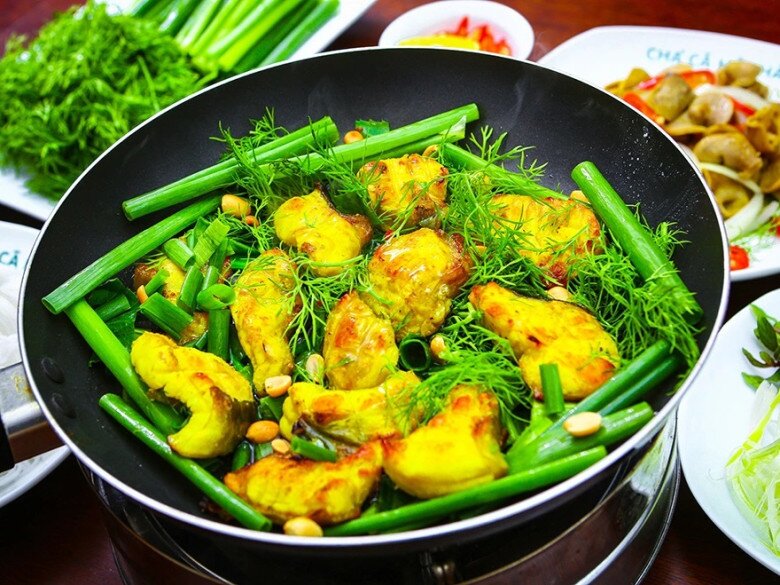
Dill is an essential ingredient in Hanoi’s famous “cha ca la vong” dish. Photo illustration.
Doctor Vu stated that in Traditional Chinese Medicine, dill is a very commonly used herb. According to the book “Nam Duoc Than Hieu,” dill seeds and leaves have a spicy and warm nature, are non-toxic, and help regulate digestion, strengthen the kidneys, benefit the spleen, eliminate bloating, and treat abdominal pain and toothaches. Additionally, it stimulates the appetite, aids digestion, and increases milk production in breastfeeding women.
In modern medicine, dill is recognized for its low-calorie, low-fat, and cholesterol-free properties, while being rich in potassium, iron, and various vitamins, especially vitamin C. According to the United States Department of Agriculture (USDA), the vitamin C content in dill is higher than that of oranges. Specifically, 100 grams of oranges contain 55.2 mg of vitamin C, while the same amount of dill contains 85 mg of this essential nutrient.
Research has indicated that vitamin C is crucial for a robust immune system, aiding in wound healing and metabolism. Furthermore, vitamin C has been proven to be a potent antioxidant, protecting cells from the damaging effects of free radicals.
Additionally, dill is a rich source of vitamin A, which is essential for maintaining healthy vision and supporting the immune system. It also plays a significant role in reproductive health for both men and women. Dill is also a good source of manganese, which supports normal brain and nervous system function and aids in the metabolism of carbohydrates and fats. The following are some additional health benefits of dill:
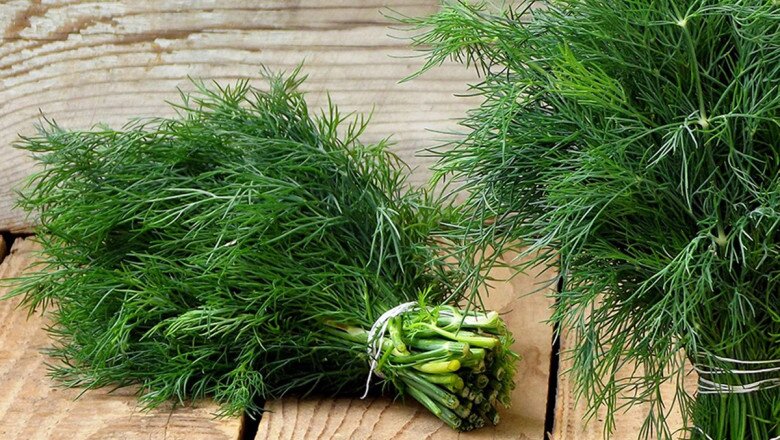
Dill is priced at approximately VND 90,000 per kilogram. Photo illustration.
Provides Antioxidants
Both the seeds and leaves of dill have been found to be rich in certain plant compounds with antioxidant properties, including flavonoids, terpenoids, and tannins. These natural antioxidants help protect cells from the damaging effects of unstable molecules known as free radicals. Consuming foods rich in antioxidants can help reduce chronic inflammation and prevent or even treat various diseases, including heart disease, Alzheimer’s, rheumatoid arthritis, and certain types of cancer.
May Benefit Heart Health
Cardiovascular disease is a leading cause of death worldwide. The flavonoids present in dill have been shown to protect heart health due to their powerful antioxidant and anti-inflammatory properties. Moreover, animal studies suggest that extracts from dill may have cholesterol-lowering effects.
May Help Lower Blood Sugar
Prolonged high blood sugar levels can lead to insulin resistance, metabolic syndrome, and diabetes. Dill has been proven to be effective in lowering blood sugar. Several studies on diabetic animals have demonstrated significant improvements in fasting blood sugar levels when supplemented with dill extracts daily. However, human studies in this area are limited.
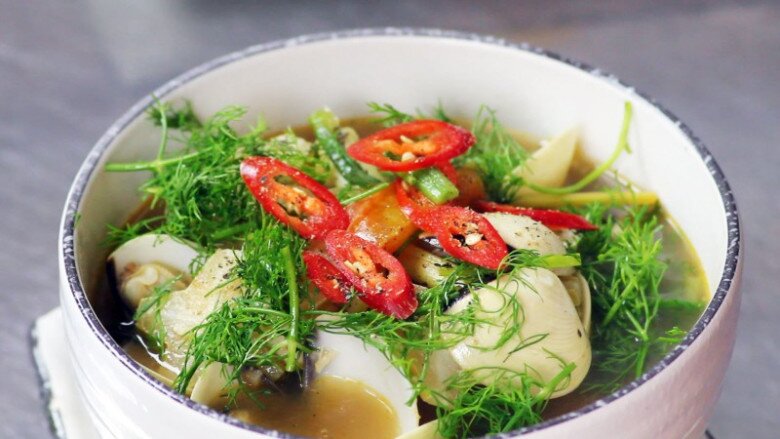 Dill in clam soup. Photo illustration.
Dill in clam soup. Photo illustration.
Precautions when consuming dill
According to Doctor Vu, dill is generally safe for consumption. However, in rare cases, it may cause allergic reactions, vomiting, diarrhea, mouth irritation, redness of the tongue, and throat swelling. Therefore, it should be consumed with caution.
– Pregnant and breastfeeding women should avoid using dill essential oil, as research on its safety for these populations is limited.
– Dill should be used sparingly as a garnish. It can be finely chopped and sprinkled over salads, sauces, or added to dishes containing fish, eel, lamb, or eggs…
“Heaven’s Gift” Lies Beneath: A Rainy Delicacy with a Unique Flavor and Digestive Benefits, Priced at 500,000 VND per kg.
The rainy season transforms the mountainous regions as locals venture into the forests to collect wild mushrooms, with the prized egg-yolk mushroom being a sought-after delicacy. With its exquisite flavor and exceptional nutritional value, this unique fungus promises a lucrative income for those who find it.
























